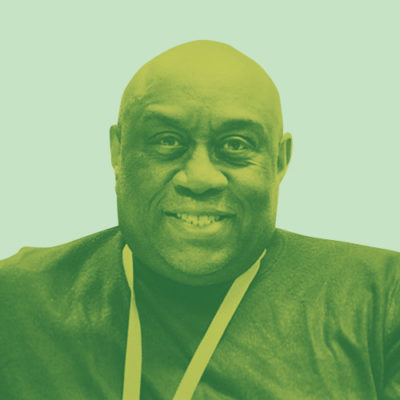Listening to Andy Clarke
I hear the isolation Andy felt. That is the bit that is overlooked if you are not part of a marginalised group. To me the museum feels like a welcoming and open place. We miss that this doesn’t exist for others.
Martyn Lenton, Project Manager Exhibitions
Andy saying that he wasn’t banging the drum as loud as he wanted feels like a controlled experience, of being muffled. We’ll let you talk about this, but don’t make too much fuss. It feels very painful.
Gin Jacobucci, Volunteers Coordinator
It’s almost as if he is saying that even if he banged the drum very loud nothing would have happened. The second part of the text sounds more hopeful.
John Rooney, Operations Manager
It sounds like he has been empowered through the project and what happened internationally. Maybe having those discussion in the staff group have given him the agency to do the work he is doing, he has been doing many things in the diversity agenda recently. What Andy is saying in this piece is a lot for him to share, it is important to have a place where you feel like you can do that.
Elaine Richmond, Partnership and Participation Manager
I really related to Andy’s piece. The sense of not being able to express yourself in fullness. The question of being able to speak. Even now, though the piece outlines a trajectory and journey over time where progress is made, I would question how fully the Museum has made a space for Andy’s voice. Upon first reading, I immediately noticed how the tone feels quite removed in how he expresses a deeply personal and frustrating experience. In his unpacking of this he is logical and very measured. I relate to this so closely. As people of colour, trying to bring challenge to the whiteness we are faced with and limited by, we are forced to express ourselves in this way – we are always aware that if we were to truly express the upset, the anger, how cut up we feel, that we might fail to make use of an opportunity to create change. Always, we are asked to take the moral high ground and to be better than we want to be. In the passage about time and history colliding, and the shift of the museum in a direction which allows for these conversations to be had, I sensed this strongly. The feeling of how to use this rare opportunity and to use it well. Being conscious that he is trying to elicit a response. Being forced to be careful and to prioritise the feelings of white colleagues. It’s what you have to do. And always that pressure to end with something positive, to leave people with something constructive which I touch on in my own piece. In this, there is a sense of preserving white colleagues’ feelings, who might not only be your colleagues but your friends, the people you spend your day with, but there is also the question of self-preservation. In my own experiences, when I have had to raise something difficult I have felt very self-conscious, wondering how people will respond to me in future, if it will diminish how people see me; there is always this fear in being a minority, sometimes subconscious and sometimes very loud in your mind. I suppose the piece left me wanting to ask: if I was still at the museum would I be able to speak?
Pakeezah Zahoor

Andy Clarke's moment
I joined the Science Museum Group (SMG) as the STEM Ambassador manager for West Yorkshire, in January of 2017. My...



